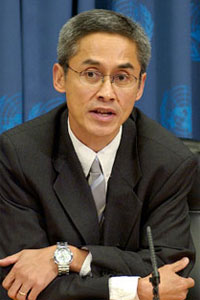
The Universal Declaration of Human Rights (UDHR) capped 2023 by celebrating its 75th birthday just before the year's end. As the seminal UN document on human rights, it is closely linked with the four freedoms: namely, freedom of expression, freedom of worship, freedom from want and freedom from fear. Where are we in that long march towards their realisation?
Even though those freedoms are often associated with the proclamation of former US president Franklin D Roosevelt in the early 1940s, the roots of those freedoms can be traced back to the cradle of time.
Sadly though, the violations are ubiquitous. World War II was itself a testament to this. Today, the wars in the Ukraine, Gaza and Myanmar, coupled with myriad situations of violence, wreak havoc in many corners of the globe. They are accompanied by rampant poverty, wealth gaps, environmental degradation, recurrent disasters and pervasive authoritarianism in many regions.
Yet it is still essential to advocate more effective protection of human rights, peace, democracy and sustainable development, and to project hope and the preferred way.
The UDHR in 1948 covers a wide range of rights and freedoms in the civil, political, economic, social and cultural fields, offering universal standards as a minimum to be followed.
In the UDHR's 30 articles, it is intriguing to note what was omitted from the final text. The document avoids the word "man" and opts for "human beings" and "everyone", thus correctly avoiding a male-centred approach.
It does not use the word "citizens", thus preferably entrenching the non-discrimination principle that those rights and freedoms are inherent to everyone irrespective of citizenship and other origins. It excludes the word "God" from the text, thus ensuring the secular tone of the commitment.
What about now? There are unresolved dilemmas as well as new quandaries, as pinpointed this month by the High Level Conference hosted by the Office of the UN High Commissioner for Human Rights in Geneva, especially to invite pledges from governments to fulfil human rights.
Four key topics permeated the discussions: peace and security; digital technologies; climate change and environmental crises; and development and the economy.
Inevitably, on peace and security, the UN Security Council's failure to address flashpoints because of the veto power exercised by one or more of the superpowers, is the most debilitating.
While reform of that body is long awaited, the question today is whether other organs of the UN, such as the UN General Assembly, the UN Peace-building Commission and related bodies can be mobilised more effectively to prevent crises rather than react to them.
While digital technologies can be a boon, they can also be a bane, as witnessed by current negotiations on whether to regulate or prohibit self-automated killer robots. There is another techno-issue now under the UN Human Rights Council; how to grasp the implications of neuro-technology affecting "cognitive" freedom of the human person, especially if techno-devices inserted into the human body may have Frankenstein-like repercussions.
Meanwhile, global warming and climate change predominate in the impetus to mitigate the harm. At the most recent conference in Dubai, there was at least a constructive stepping stone with traction for business sector cooperation to curb the emission of methane, as well as to promote more renewable energy and green efficiency.
The other two elements of the crisis also need more attention, namely pollution (especially plastic waste) and loss of biodiversity.
On the development front, there are already Sustainable Development Goals which guide global action anchored on 17 linchpins, such as to eradicate poverty by 2030.
The UN is also promoting the implementation of economic, social and cultural rights, such as the right to decent work and social protection, as a portal for a "human rights economy". These need to be complemented by an astute drive for more democratisation with civic and political space.
In the march towards the centenary of the UDHR in 2048, it might be an understatement to observe that the age of precarity is here. It calls for global/local solidarity among stakeholders -- governmental, non-governmental and businesses -- to respond to crises and disasters.
It demands greater planning and implementation with youth and children as a part of inter-general responsiveness, especially in the face of AI and ecological mutations, and their intersectionality with gender and people's participation in the multilateral system, such as a potential UN people's town hall.
Respectful of international law, personal actions, such as pro bono work, will still matter to help tackle key issues, without waiting for global institutions to act. Empathy between humans will still need to be nurtured through inclusive education and socialisation. Ultimately, development cannot overlook or supersede the call of the human spirit premised on consciousness, conscience and care-cum-consideration towards others, in our shared humanity.
